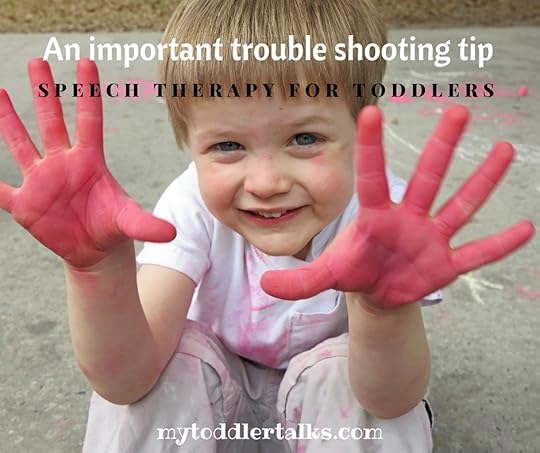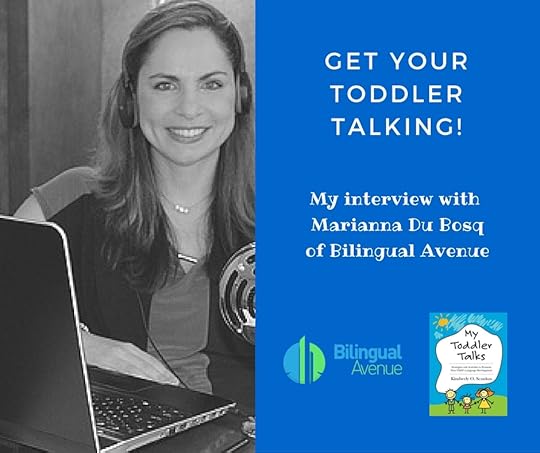Kimberly Scanlon's Blog
February 14, 2019
How to Replace Your Toddler’s Screen Time
Introduction This post has been written to assist you in devising a plan to replace, or greatly reduce, your child’s screen time. Before delving in, I want to disclose that I have two children, a 6-year-old daughter and a 17-month-old son. Our 6 year-old gets some screen time. She thoroughly enjoys ridiculous YouTube videos and […]
The post How to Replace Your Toddler’s Screen Time appeared first on My Toddler Talks.
September 9, 2018
How to Use Play Dough to Get Your Toddler to Talk
I use play dough almost every day of the week. It is one of the best tools to use to get your toddler to talk. I have written a specific play routine in My Toddler Talks: Strategies and Activities to Promote Your Child’s Language Development about how to use play dough to encourage language development. If […]
The post How to Use Play Dough to Get Your Toddler to Talk appeared first on My Toddler Talks.
December 12, 2017
Shhh! A Holiday Book to Promote Toddler Language
Gosh. It’s happened again. It’s been months since I’ve written. I’m sorry! I can explain the reasons for my absence in my next post. In the meantime, I’ll quickly share a super cute board book you can read with your toddler or preschooler just in time for the holidays. Shhh! is the perfect holiday book […]
The post Shhh! A Holiday Book to Promote Toddler Language appeared first on My Toddler Talks.
July 10, 2017
Summer Time: Pouring to Improve Attention, Fine Motor Skills, Independence, and Language
Summer is here! That means warm, sunny days, and lots of playing outside. When play moves outdoors, there are many wonderful opportunities for children to involve their senses, create memories, be with nature, and communicate. One simple activity that naturally occurs when children are playing in pools, lakes, or in the ocean is pouring. Give […]
The post Summer Time: Pouring to Improve Attention, Fine Motor Skills, Independence, and Language appeared first on My Toddler Talks.
May 31, 2017
Toddler Language: A Song to Help Transition Between Activities and Tasks
Photo Credit: D Simmonds Working with toddlers on a regular basis I know transitions can be tough for toddlers. Who wants to stop playing to go grocery shopping? Who wants to leave the park to pick Johnny up from school? Sometimes sudden, unexpected transitions can result in tantrums or meltdowns, leaving you and your child […]
The post Toddler Language: A Song to Help Transition Between Activities and Tasks appeared first on My Toddler Talks.
April 28, 2017
How Do I Get My Toddler to Sit and Focus During a Speech Therapy Session?
Every so often I receive emails from parents or therapists that I don’t know personally nor have ever met. The other day, a mom emailed me with the following question: “My daughter is 2 and a half years old and very speech delayed. I think the biggest obstacle is that she doesn’t want to sit […]
The post How Do I Get My Toddler to Sit and Focus During a Speech Therapy Session? appeared first on My Toddler Talks.
March 30, 2017
What’s New at My Toddler Talks
I’ve fallen a little behind on writing my monthly blog posts. I’m sorry! This past year has been extremely busy. Last April, I moved into a new office space in Ramsey and ramped up seeing my clients. I’ve included two pictures below: Additionally, for the past two years or so (…maybe more…I lose track […]
The post What’s New at My Toddler Talks appeared first on My Toddler Talks.
February 2, 2017
How to Decrease Background Noise to Promote Word Learning in Early Intervention
Photo Credit: cseeman Flickr Recent research is confirming that background noise inhibits children’s ability to acquire new words. Psychologists from the University of Wisconsin in Madison, Brianna T. M. McMillan and Jenny R. Saffran found in their repeated studies that: When presented with novel words that were only 5 dB louder than the background speech, […]
The post How to Decrease Background Noise to Promote Word Learning in Early Intervention appeared first on My Toddler Talks.
June 29, 2016
Speech Therapy for Toddlers: Keep the Communication Real
Photo Credit: babyfella2007
Speech Therapy For Toddlers: Keep the Communication Real
You think you’re doing everything right. You strategically use self-talk and parallel talk, you give premeditated choices, and wait so expectantly that you begin to wonder if your eyebrows will remain raised indefinitely. However, your toddler is not amused by your funny way of speaking and refuses to engage.
You ask yourself: “Why are the techniques not working?”
You think: “I’m using all the strategies.”
You think some more: “Sometimes Jonas seems to speak more during those moments…when nothing is really expected.”
If you’re a parent trying to boost your toddler’s language skills, or are a fellow speech therapist, wondering the same thing, let me reassure you, I’ve asked myself the same questions.
Here’s what it boils down to:
When language is elicited it should be real and authentic.
Communication is a two way street. Why should your toddler speak or want to speak if he feels he’s just a puppet being talked at rather than spoken to?
If you are so focused on saturating your toddler’s play routines or daily routines with techniques then those communicative moments are no longer real and authentic. Therefore, use the techniques strategically and also as naturally as possible.
The child has to want to communicate.
Are you giving him or her something worth communicating about? It’s your responsibility to make the speech therapy session or communicative moment irresistible (hats off to fellow speech therapist Gina Davies from across the pond for that precise language – irresistible). Give the child a true reason to communicate and respond.
The child has to feel you are genuine with your questions and comments.
Say something because it adds value to the conversation not because you fear the silence.
Parents, please resist thinking that your speech therapist is not working because he or she is allowing for some quiet moments.
This silence gives the child a chance to process verbal information as well as the opportunity to initiate communication.
The beauty in so many of the language elicitation strategies is that they work best when not overused or spoiled with inauthenticity.
Sometimes less is more.
Keep it real and keep it authentic. Do not allow the techniques to loose their power by fading into the background.
Ask yourself three questions:
Does this interaction feel natural, real, or authentic?
Would I want to talk to this person?
Am I over-using the techniques so much that there are no breaks for silence and reflection?
For more tips, please see the Troubleshooting Tips: What to Do if the Toddler is Not Imitating You, in My Toddler Talks: Strategies and Activities to Promote Your Child’s Language Development . [image error]Amazon affiliate link included. Thanks for your support!
I wish you the very best.
The post Speech Therapy for Toddlers: Keep the Communication Real appeared first on My Toddler Talks.
April 28, 2016
Interview: Get Your Toddler Talking!
Interview: Get Your Toddler Talking!
Recently, I had the awesome opportunity to chat with Marianna Du Bosq, a bilingual mother, a former educator, and the creator of the informative website Bilingual Avenue. We had a great time discussing various topics related to toddler language development. The interview is approximately 40 minutes long and it’s jam packed with so much useful information!
If you ever had any of the following questions, you’ll find the answers (AND EVEN MORE – a special freebie for My Toddler Talks readers, keep reading to find out!) in this interview with Marianna:
1. What can readers gain from reading My Toddler Talks and what should they expect?
2. Can you describe how play relates to language?
Related post: Toddlers: The Importance of Play
3.Why are predictable routines helpful for learning?
Related post: Toddlers: The Importance of Routines
4. How Can We Incorporate Routines Into Everyday Play with Our Children?
5. Can you share with us some of your favorite language modeling techniques?
Related posts:
Self-Talk and Parallel Talk
How to Ask Questions
Cloze Procedures
Waiting Expectantly
Pausing
6. What are some common mistakes that you see parents make when working on language development with their children? What can we do to avoid them?
7. What would you say to parents who are struggling to get their children to talk?
8. I spend a lot of time talking to my listeners about setting goals. What advice do you have for setting goals around language development? Could you share an example?
9. What is one last piece of advice you’d like to pass on to our listeners?
Related posts: Ways to Stay Hopeful When You Want to See Change Now
I invite you to listen to it!
Please click the picture below to tune into to interview:






